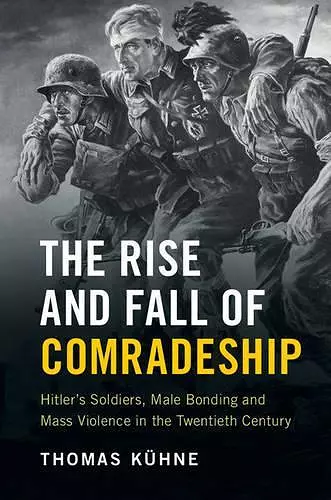The Rise and Fall of Comradeship
Hitler's Soldiers, Male Bonding and Mass Violence in the Twentieth Century
Format:Hardback
Publisher:Cambridge University Press
Published:9th Feb '17
Currently unavailable, and unfortunately no date known when it will be back
This hardback is available in another edition too:
- Paperback£24.99(9781107658288)

This book reveals how ideas of comradeship shaped the actions and mindsets of ordinary German soldiers across the twentieth century.
Investigating how the ideals of kameradschaft (comradeship) developed within Germany as a collective yearning for national unity, this book explores how a divided society came to terms with the traumas of war and defeat. Across the twentieth century the gospel of comradeship not only provided the foundation for mass murder, but also for democratic peace post-1945.This is an innovative account of how the concept of comradeship shaped the actions, emotions and ideas of ordinary German soldiers across the two world wars and during the Holocaust. Using individual soldiers' diaries, personal letters and memoirs, Kühne reveals the ways in which soldiers' longing for community, and the practice of male bonding and togetherness, sustained the Third Reich's pursuit of war and genocide. Comradeship fuelled the soldiers' fighting morale. It also propelled these soldiers forward into war crimes and acts of mass murders. Yet, by practising comradeship, the soldiers could maintain the myth that they were morally sacrosanct. Post-1945, the notion of kameradschaft as the epitome of humane and egalitarian solidarity allowed Hitler's soldiers to join the euphoria for peace and democracy in the Federal Republic, finally shaping popular memories of the war through the end of the twentieth century.
'Probing into the Janus-faced quality of comradeship, Thomas Kühne illuminates the moral world of Nazi Germany on its own terms, a world in which most German soldiers acted as they did, not because they were forced to do so, but because they thought it was right. Obsessed with the 'virtue' of being held in high esteem by their 'masculine' comrades, they had scant concern for their victims. This book makes an essential contribution to understanding the capacity to commit terrible atrocities without remorse in Nazi Germany.' Christopher Browning, University of North Carolina
'War is a powerful generator of solidarity. Thomas Kühne explores the rise and decline of the German version of this phenomenon, Kameradschaft. It was a myth that was lived in World War II and came to shape male identity into the late twentieth century. How, why and with what consequences this happened is the subject of this powerful exploration.' Michael Geyer, University of Chicago
'An original, comprehensive, and incisive analysis of the concept, myth, reality, and ultimate disintegration of soldiers' comradeship in modern Germany and its profound implications for the manner in which German men imagined war, perpetrated violence, and for long managed to avoid coming to terms with their complicity in the crimes of the Nazi regime. Set within the larger context of European and American ideas and practices of military cohesion, this is an important book that should be read by all students of modern and military history.' Omer Bartov, Brown University, Rhode Island
ISBN: 9781107046368
Dimensions: 235mm x 160mm x 20mm
Weight: 560g
310 pages